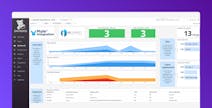- Product
Infrastructure
Applications
Logs
Security
- Code Security
- Software Composition Analysis
- Static Code Analysis (SAST)
- Runtime Code Analysis (IAST)
- IaC Security
- Cloud Security
- Cloud Security Posture Management
- Cloud Infrastructure Entitlement Management
- Vulnerability Management
- Compliance
- Cloud SIEM
- Workload Protection
- App and API Protection
- Sensitive Data Scanner
- Security Labs Research
- Open Source Projects
- Secret Scanning
Digital Experience
Software Delivery
Service Management
AI
Platform Capabilities
- Customers
- Pricing
- Solutions
- Financial Services
- Manufacturing & Logistics
- Healthcare/Life Sciences
- Retail/E-Commerce
- Government
- Education
- Media & Entertainment
- Technology
- Gaming
- Amazon Web Services Monitoring
- Azure Monitoring
- Google Cloud Monitoring
- Oracle Cloud Monitoring
- Kubernetes Monitoring
- Red Hat OpenShift
- Pivotal Platform
- OpenAI
- SAP Monitoring
- OpenTelemetry
- Application Security
- Cloud Migration
- Monitoring Consolidation
- Unified Commerce Monitoring
- SOAR
- DevOps
- FinOps
- Shift-Left Testing
- Digital Experience Monitoring
- Security Analytics
- Compliance for CIS Benchmarks
- Hybrid Cloud Monitoring
- IoT Monitoring
- Real-Time BI
- On-Premises Monitoring
- Log Analysis & Correlation
- CNAPP
Industry
Technology
Use Case
- About
- Blog
- Docs
- Login
- Get Started
Energy
1,200 Employees
Switzerland
About Alpiq
Alpiq is a Swiss energy services provider and electricity producer. Its power plant portfolio comprises shares in two Swiss nuclear power plants as well as flexible thermal power plants, wind farms, and photovoltaic systems in Europe.
“The Datadog Mule® integration allows us to implement end-to-end monitoring since all our applications are now monitored in Datadog.”

Amine Ajil
Head of Integrations
Alpiq

“The Datadog Mule® integration allows us to implement end-to-end monitoring since all our applications are now monitored in Datadog.”
Amine Ajil
Head of Integrations
Alpiq
Why Datadog?
- Easy to pivot seamlessly between APM and Log Management
- Enables end-to-end visibility
- Ease of use and fast onboarding
- Enables Mule monitoring with the Datadog Mule® Integration
Challenge
Alpiq used five separate monitoring tools, which reduced productivity, increased costs, and prevented it from achieving end-to-end visibility. As part of a company-wide cloud migration initiative, the team also needed to migrate from its Tibco on-premises integration platform to the cloud-based MuleSoft platform and enable MuleSoft monitoring within the Datadog environment.
Use Case
Key Results
MTTD reduced 25 →30%
Maximized visibility into the Anypoint platform by MuleSoft
5 → 1 monitoring tool
Enabled tool consolidation
Use of multiple monitoring tools restricts visibility
Alpiq is a Swiss energy services provider and electricity producer that specializes in trading and power production. The company has generated climate-friendly and sustainable electricity from carbon-free Swiss hydropower for more than a hundred years. Today, Alpiq uses digital tools to optimize electricity generation and consumption as well as energy flow between producers, prosumers, and consumers to stabilize the electricity grids.
Amine Ajil, Head of Integrations, leads a small team of five responsible for Alpiq’s integration platform and API implementation. The company previously used more than five separate monitoring solutions, which reduced productivity, increased costs, and prevented Ajil’s team from achieving full end-to-end visibility. Ajil sought to adopt a monitoring solution that could enable his team to monitor everything in one place and could be used company-wide.
At the same time, Alpiq was working to become a cloud-first company as part of its overall mission to improve agility and user experience. Two years ago, Alpiq adopted Datadog as its company-wide observability platform as part of a broader cloud migration and tool consolidation strategy. As a result, Ajil’s team faced the dual challenge of migrating from Tibco, an on-premises integration platform, to the cloud-based Anypoint Platform by MuleSoft while also finding the optimal approach to enable MuleSoft monitoring within the Datadog environment. “We considered building our own monitoring tool, but we didn’t have a dedicated team for such development, so the maintenance would have been complex,” says Ajil.
Without proper visibility into its integration platform’s performance, Ajil’s team—which provides services for almost the entire company and connects all its critical applications—would struggle to promptly integrate apps and troubleshoot issues, potentially impacting essential functions like trading and power plant operations.

Datadog Marketplace leads to MuleSoft integration solution
While looking for a MuleSoft monitoring solution, Ajil discovered the Datadog Marketplace, a collection of integrations, apps, software licenses, and professional services that allow customers to gain even more visibility into their stack and improve workflows. One such offering was the Datadog Mule® Integration built by IO Connect Services, a Datadog Technology Partner who specializes in providing information technology consultancy services with technologies like MuleSoft, AWS, and Salesforce Commerce Cloud.
Ajil tested the Datadog Mule® Integration and saw immediate value. The setup process was straightforward and the IO Connect Services team was readily available when he had questions. “It probably only took a couple of hours to set up the integration, and the people from IO Connect were comfortable to work with and helped us a lot,” he says. “My first impression was the ease of use and fast onboarding. I had initial hesitations about switching monitoring tools, but I was pleasantly surprised at how clear it was to navigate the platform.”
Within the same day of setting up the Datadog Mule® Integration, Ajil became comfortable with the tool and started saving his favorite views to immediately display the most commonly sought-after resources. He quickly learned how seamlessly the Integration worked with Datadog APM. Using the Datadog APM connector inside the Mule applications, Ajil uses a drag and drop interface to build a flow for what type of information he wants to send into the Datadog platform, which allows API logs to populate directly in Datadog APM’s Traces tab. The Traces tab allows him to view every API in a list view, and he can quickly search for specific traces/APIs using tags or by filtering with facets on the left side navigation bar. “The Datadog Mule® integration allows us to implement end-to-end monitoring since all our applications are now monitored in Datadog. With a single glance in the Traces view, I can quickly identify any issues with an API, select the needed resource, and control the granularity to find the exact info I’m looking for—none of which was possible with our previous monitoring solution.”
“When I’m implementing APIs for other teams, I actively try to show them how to use Datadog, especially for business teams because they can quickly familiarize themselves with the platform since it’s so intuitive.”
Maximizing visibility into MuleSoft’s Anypoint Platform and Mule applications
Ultimately, IO Connect Services’ Datadog Mule® Integration worked seamlessly with the Datadog platform and allowed Ajil to maximize visibility into the Anypoint platform by MuleSoft. When an issue was raised in the past, Ajil didn’t know precisely where the problem was happening. Now, his team sets up monitors to alert them to issues with different services. They can then seamlessly pivot between APM and Log Management to identify and troubleshoot issues in one unified platform, reducing MTTD by 25 to 30 percent. This effort also helped with Alpiq’s overall cloud migration and tool consolidation initiatives, allowing it to go from five monitoring tools to just one, which reduced costs and improved agility and user experience.
Ajil believes there’s still much to unlock with the Datadog platform and Datadog Mule® Integration, including interacting more frequently with APM’s Service Catalog, as well as implementing out-of-the-box vCore utilization dashboards so his team gets alerted on and doesn’t exceed their allocated vCores usage. He also pushes adoption of the Datadog platform to cross-functional teams. “When I’m implementing APIs for other teams, I actively try to show them how to use Datadog, especially for business teams because they can quickly familiarize themselves with the platform since it’s so intuitive.”



